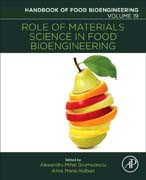
Role of Materials Science in Food Bioengineering
Grumezescu, Alexandru Mihai
Holban, Alina Maria
The Role of Materials Science in Food Bioengineering, Volume 19 in the Handbook of Food Bioengineering, presents an up-to-date review of the most recent advances in materials science, further demonstrating its broad applications in the food industry and bioengineering. Many types of materials are described, with their impact in food design discussed. The book provides insights into a range of new possibilities for the use of materials and new technologies in the field of food bioengineering. This is an essential reference on bioengineering that is not only ideal for researchers, scientists and food manufacturers, but also for students and educators. Discusses the role of material science in the discovery and design of new food materialsReviews the medical and socioeconomic impact of recently developed materials in food bioengineeringIncludes encapsulation, coacervation techniques, emulsion techniques and moreIdentifies applications of new materials for food safety, food packaging and consumptionExplores bioactive compounds, polyphenols, food hydrocolloids, nanostructures and other materials in food bioengineering INDICE: 1. Potentials of food bioengineering: From fundamental to recent developments2. New Trends in Food Technology for Green Recovery of Bioactive Compounds from Plant Materials3. Different Bioengineering Approaches on Bioflavor Production4. Polyphenols and their encapsulation for food applications5. Microparticulate Systems for Rational Use of Macromolecular Therapeutic Ingredients in Foods6. Potential applications of cyclodextrin inclusion complexes, liposomes, and drug-in-cyclodextrin-in-liposomes in food industry and packaging7. Coacervation Technique As An Encapsualtion And Delivery Tool For Hydrophobic Biofunctional Compounds8. Biocompatibility And Toxicity Of Allotropic Forms Of Carbon In Food Packaging9. Food hydrocolloids as matrices for edible packaging applications10. Delivery System for Poor Water Solubility Nutrient11. Fabrication of functional electrospun nanostructures for food applications12. Application of Emulsion Technique for Microencapsulation of Lactobacillus plantarum in Alginate/Resistant Starch Beads13. Probiotic and Synbiotic Yogurt Production By Using Free or Alginate/Resistant Starch Microencapsulated Lactobacillus plantarum14. Aptamer based analytical strategies: A Promising Alternative for Food Safety Control15. bioactive peptides as functional food ingredients
- ISBN: 978-0-12-811448-3
- Editorial: Academic Press
- Encuadernacion: Rústica
- Páginas: 472
- Fecha Publicación: 16/02/2018
- Nº Volúmenes: 1
- Idioma: Inglés
